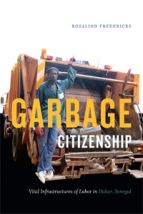Garbage Citizenship: Vital Infrastructures of Labor in Dakar, Senegal

Trash isn’t just about trash, and Garbage Citizenship isn’t solely about urban rubbish collection in Senegal’s capital. The book uses waste collector strikes and activism to explore broader effects of labour relations, citizen advocacy, neoliberal reform, and religious understandings of purity and pollution. As the introduction sums up: “This analysis bridges a cultural politics of labor with a materialist understanding of infrastructure, through an ethnography of everyday infrastructures of disposal” (page 4).
At the same time, this discussion is very much grounded in the physical reality of waste. The word “grimy” pops up again and again. As a substance that residents encounter daily, and that affects all the senses, garbage is hard to avoid. And this is exactly the point.
One key period of analysis is 1988–1989, when Dakar’s residents were feeling the effects of a punishing structural adjustment programme. The city was rocked by youth riots, political unrest, and the cancellation of a school year—all of which led to the build-up of rubbish on the streets. In response, the government effectively co-opted Set/Setal (“Be Clean/Make Clean” in Wolof), the youth movement at the core of the protests. The city turned many of these activists into urban garbage collectors, framing this work as critical to both good citizenship and healthy modernization.
This was followed by periodic battles between different levels of government, and between different kinds of actors, about responsibility for municipal waste collection. The corollary was that the public dumping of waste continued to be a highly visible symbol of dissent. Accumulation of waste has also become a conspicuous symbol of neglect of low-income, informal areas.
Fredericks’ analysis of “governing-through-garbage” shows how Dakar’s workers have resisted the stigma attached to refuse collection, partly through reclaiming garbage as a potent political and moral tool.
Introduction available at:
https://www.dukeupress.edu/Assets/PubMaterials/978-1-4780-0141-6_601.pdf
Further reading:
Mizes, James Christopher (2016), “Who owns Africa’s infrastructure?”, Limn Vol 7, available at https://limn.it/articles/who-owns-africas-infrastructure-2/.
Tvedten, Inge (2018), “ ‘Flooding our eyes with rubbish’: urban waste management in Maputo, Mozambique”, Environment and Urbanization Vol 30, No 2, pages 631–646, available at https://journals.sagepub.com/doi/full/10.1177/0956247818780090.
Book note prepared by Christine Ro
Search the Book notes database
Our Book notes database contains details and summaries of all the publications included in Book notes since 1993 - with details on how to obtain/download.
Use the search form above, or visit the Book notes landing page for more options and latest content.
For a searchable database for papers in Environment and Urbanization, go to http://eau.sagepub.com/

